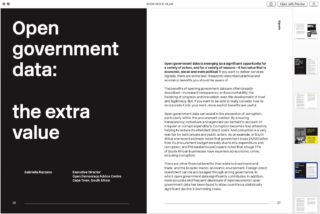
Open government data is emerging as a significant opportunity for a variety of actors, and for a variety of reasons – it has value that is economic, social and even political. If you want to deliver services digitally, there are some less-frequently described practical and economic benefits you should be aware of.
The benefits of opening government data are often broadly described – increased transparency and accountability; the fostering of progress and innovation; even the development of trust and legitimacy. But, if you want to be able to really consider how to incorporate it into your work, more explicit benefits are useful.
Open government data can assist in the prevention of corruption, particularly within the procurement context. By ensuring transparency, individuals and agencies can be held to account on irregular or corrupt expenditure. Corruption becomes less attractive, helping to reduce its attendant direct costs. And corruption is a very real risk for both private and public actors. As an example, in South Africa one recent estimate noted that government loses ZAR30 billion from its procurement budget annually due to mis-expenditure and corruption, and PricewaterhouseCoopers noted that a huge 77% of South African businesses have experienced economic crime, including corruption.
There are other financial benefits that relate to investment and trade, and the broader macro-economic environment. Foreign direct investment can be encouraged through strong governance, to which open government data significantly contributes. In addition, more accurate and frequent disclosure of macroeconomic open government data has been found to allow countries a statistically significant decline in borrowing costs.
These kinds of economic benefits can have more local application as well – open government data can be used to reduce the “red tape” that prevents businesses and agencies from thriving. It can also enhance market entry, and allow for greater access to procurement systems by a wider range of actors.
Many countries have “access to information” laws, allowing citizens to request information through different procedures. These laws are an essential component of ensuring transparency, but they can be costly to implement: there are direct personnel, time and other implementation costs that departments find challenge their ability to comply, particularly at local government level. Proactive disclosure of government data can help: recent research by the Sunlight Foundation showed that cities adopting open data policies saw a reduction of 30% in the number of requests needing to be processed.
Accurate open data can be used to help not only in your reporting (and automate significant portions of it), but also to accelerate coordination efforts between departments, and/or agencies. These improvements in efficiency and time have very direct economic value: the European Commission has estimated that open government data will save European countries about EUR1.7 billion by 2020 from efficiency savings. Internally, it can be used to improve evidence-based decision-making within organisations: a 2013 survey of senior business executives found that close to half of all the respondents in that context considered open data important to their strategic decision making.
As a digital team, open government data can open new doors for you. It can enhance your own internal efficiency and accountability, whilst also improving your accountability to the world at large. It can save time and money, and present new economic opportunities. These are the types of reasons you should list to advocate both for using open data, and for making your own data open. These arguments are not always readily heard: there is a natural tendency in the modern world, particularly where data is considered the “new oil”, to zealously and proprietarily sit on your data. There is real fear too, especially given the strong protectionism encouraged by the General Data Protection Regulation. But it is possible for openness and privacy to coexist.
So where to start? As with most things, it is best to get your own house in order first. A strong data audit within your organisation will help to outline what your data environment looks like. When that is in place, it becomes far easier to design your own privacy policy, but in turn this helps you outline an open data and access to information policy that is both inward and outward looking. From there, it is about ensuring strong information systems, and encouraging a corporate culture of sharing: and the easiest way to help with this is to emphasise the very real, economic and organisational benefits it will provide.